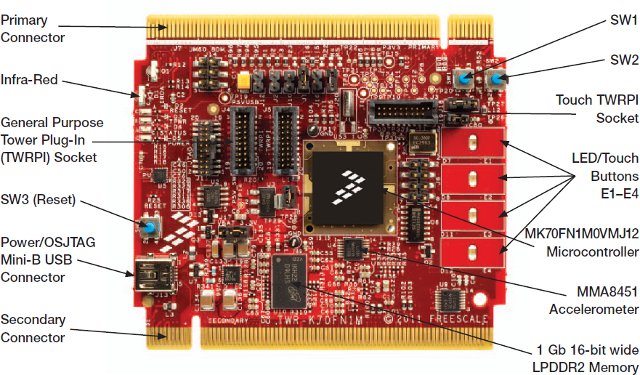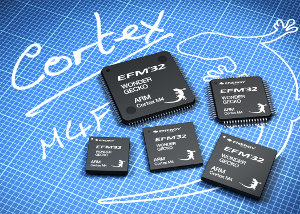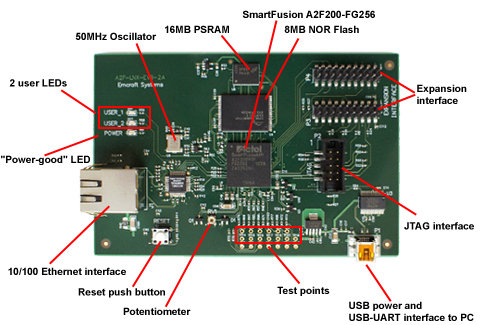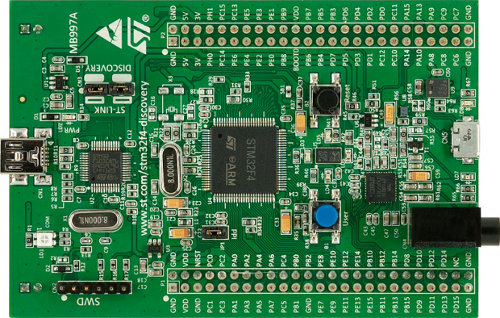Last year, I posted about Linux for Cortex M3 & M4 Micro-controllers and noted it was difficult to find cost effective Cortex-M based boards able to run uClinux or Linux (RAM being the main issue). Freescale TWR-K70F120M is a module based on Kinetis K70 MCU (Cortex M-4) with plenty of RAM (128MB) to run Linux or uClinux. It is available for 109 USD or 179 USD with Freescale Tower system (TWR-K70F120M-KIT). Here are the key features of the module: Freescale MK70FN1M0VMJ12 Cortex-M4 MCU @ 120 MHz (Product Brief) Touch Tower Plug-in Socket General purpose Tower Plug-in (TWRPI) socket On-board JTAG debug circuit (OSJTAG) with virtual serial port 128 MB DDR2 SDRAM memory 256 MB SLC NAND flash memory Three axis accelerometer (MMA8451Q) Potentiometer Micro-SD Card slot I could not find an open source uClinux implementation for Kinetis K70, but emCraft has a Linux Board Support Package (BSP) for the Freescale TWR-K70F120M-KIT […]
Energy Micro Introduces Cortex-M4F EFM32 Wonder Gecko MCU Series
Energy Micro has just announced the EFM32 Wonder Gecko series with the addition of 60 ARM Cortex-M4F based MCU to its Gecko offering or a total of 240 MCUs. The new controllers are highly energy efficient and minimize energy consumption by including a flexible range of standby and sleep modes, intelligent peripherals that allow designers to implement many functions without CPU wake-up, and ultra-low standby current. Wonder Gecko MCUs come with 256KB Flash memory and 32KB RAM and can achieve active mode current consumption of just 180µA/MHz. Devices provide a deep sleep mode that consumes just 400nA with RTC running, a shut-off mode requiring only 20nA and wake-up time as short as 2µs. The company explains that the LESENSE function block, a generic low energy sensor interface, enables monitoring of a mix of up to 16 capacitive, inductive or resistive sensors while the MCU core is in sleep or shut-off […]
Embedded World Conference 2012 Schedule
The Embedded World Conference 2012 will taken place on the February 28 – March 1 in Nuremberg, Germany. There will be over 1,000 exhibitors for the tenth conference (it started in 2003) showcasing their new products and solutions for the embedded markets. Beyond the exhibition, there will also be 13 classes and 22 sessions during those 3 days. February 28th 2012 Classes: 09:30 – 15:30 – Modeling Behavior with UML: Interactions and Statecharts by Dr. Bruce Douglass, IBM 16:00 – 17:00 – Agile Systems Engineering by Dr. Bruce Douglass, IBM 09:30 – 18:00 – Introduction to Real-Time Operating Systems by Dr. David Kalinsky, D. Kalinsky Associates 09:30 – 18:00 – Hands-on-Workshop Safety Critical Linux – Automated debugging and code screening with formal methods by Prof. Nicholas Mc Guire, OSADL Safety Critical Linux Working Group and Andreas Platschek, OpenTech. 09:30 – 16:30 – Cryptography and embedded Security – The Workshop chaired […]
Linux for Cortex M3 & M4 Microcontrollers
There are plenty of low cost Linux development boards based on Cortex A8 or A9 such as the Beaglebone, as well as some devkits based on ARM7 and ARM9 such as SAM9 development kits , but if your application is cost and/or energy sensitive you can also switch to micro-controllers using Cortex M3 or M4 based development boards such as Emcraft SmartFusion devkits. You can run a functional uCLinux system with 1MB of RAM and 1MB of flash including the TCP/IP stack. You need to use uClinux and not directly Linux, because the Cortex M3 doess not have a Memory Management Unit (MMU) and only a Memory Protection Unit (MPU). This can bring some interesting software development challenges such as (apparently random) kernel panics, the lack of fork, memory fragmentation and more. You can check out http://kernel.org/pub/linux/libs/uclibc/Glibc_vs_uClibc_Differences.txt for the main differences between uClibc and Glibc. The instructions to patch and […]
ST Micro 15 USD STM32F4-Discovery Cortex-M Development Kit
ST Microelectonics promote their Cortex-M series at ARM Techcon 2011 and especially the new STM32F4 series the most powerful cortex M4 MCUs. They also showcase a low cost development board called STM32F4-Discovery that they give away at the exhibition and that can be bought online for 14.90USD from distributors. The evaluation board is based on the STM32F407VGT6 and includes an ST-LINK/V2 embedded debug tool, two ST MEMS, digital accelerometer and digital microphone, one audio DAC with integrated class D speaker driver, LEDs and push buttons and an USB OTG micro-AB connector. A large number of free ready-to-run application firmware examples are available in the STM32F4-Discovery board firmware package to support quick evaluation and development. Key Features of the Development kit: STM32F407VGT6 microcontroller featuring 32-bit ARM Cortex-M4F core, 1 MB Flash, 192 KB RAM in an LQFP100 package On-board ST-LINK/V2 with selection mode switch to use the kit as a standalone ST-LINK/V2 […]






